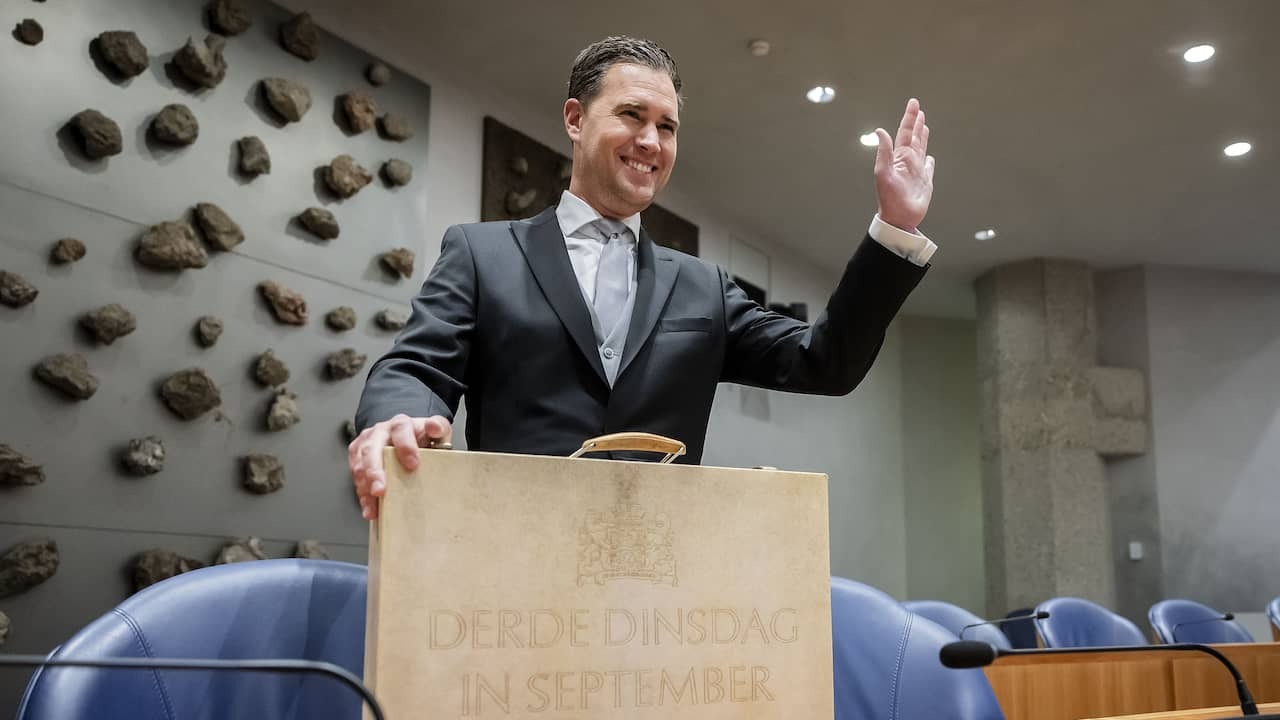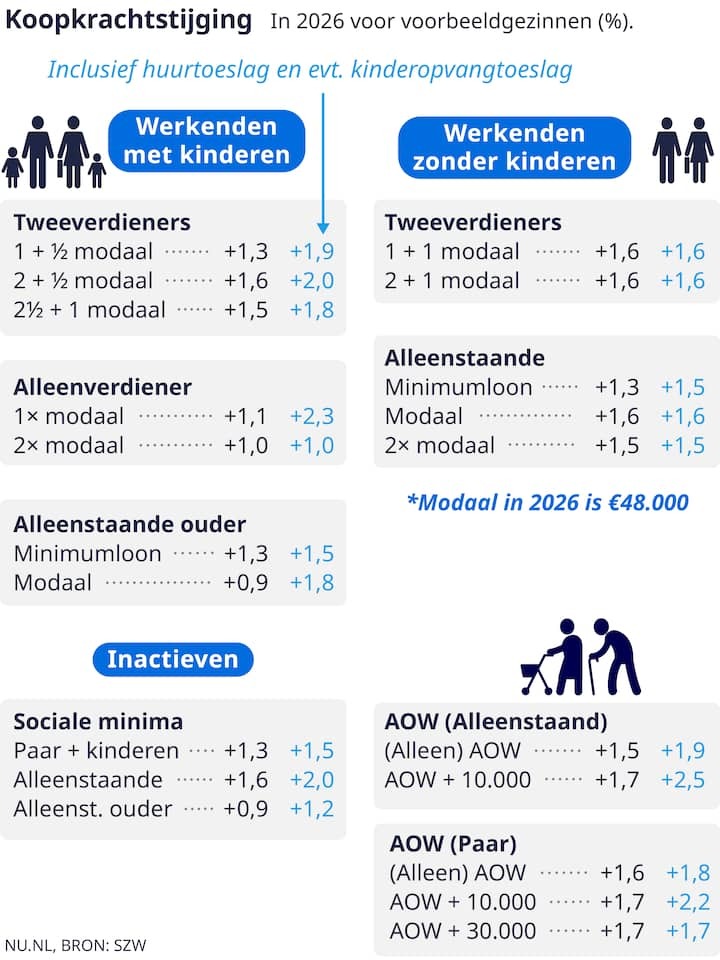
Trust in politics is low, the challenges are great and the relationships in the cabinet shaky. The political circumstances for a stable budget are hard to find. At the same time, the economy is doing its job. The purchasing power plates look good.
“Unfortunately in the Netherlands people seem to be opposed to each other more and more,” said the king in his throne. “On the street, online, at universities and not least in The Hague.” It is precisely in The Hague that there must be cooperation. While it is precisely in campaign time to emphasize the differences between parties.
Working together is not yet possible. In a few months, the PVV and then NSC first left the cabinet. Only the VVD and BBB are now left. In the Lower House that means only 32 seats.
In the Chamber, GroenLinks-PvdA leader Frans Timmermans hopes that the initiative can be taken there to change the budget. He wants to conclude a “budget agreement” with other parties this year. The question is with who. VVD leader Dilan Yesilgöz, for example, has other ideas. “I’d rather have a new cabinet after the elections.”
To the partyless Dick, the task of standing up, because we could not afford a standstill. When asked if he had started this job if he had known in advance how it would turn out, he had to think for a long time. “That is very difficult.”
Trust in politics to the low point
In the meantime, the problems for politics are not getting smaller. The housing crisis has been playing for years. “Work, neighborhood and home”, the King summarized that. Good care, a social safety net and good education. “That is topics that primarily concern people,” said De Koning.
In any case, those people have no confidence in politics to solve it for them. Seven out of ten voters indicate that they have no confidence in politics, according to research by IPSOS I&O commissioned by NOS . A considerable decrease compared to last year.
Especially in the field of immigration and the housing market, voters are not confident that The Hague will solve this. “Getting a grip on migration is one of the greatest concerns that live in the country,” said De Koning, about the file that politics itself has a hard grip. The asylum inflow has fallen, but that was not due to the intended “strictest asylum policy ever”.
Remarkably, the number of skilled migrants did fall. Between 2022 and 2024 this number fell by 40 percent. “Those are people you need,” says Monika Sie, director of the Clingendael Institute and one of the authors of the important report on demographic developments in the Netherlands.
During Prinsjesdag, it was not about the staff short of the staff, while that will be one of the biggest problems for the near future. Especially in healthcare. Sie says that former Minister of Health Tamara van Ark “discussed the prognoses of the labor market shortages in healthcare with tears in the eyes”.
In the briefcase of the Minister of Finance, in this case VVD member Eelco Heinen, there were rarely few plans.
Purchasing power increases due to higher wages
In any case, politics does not have to worry about the economy in the short term. Almost all Dutch people will have to spend more next year. This is mainly because wages rise faster than inflation. The cancellation of the excise duty on fuel also helps.
The cabinet does not solve major problems. Extending the excise tax credit on gasoline, diesel and LPG is one of the most important measures. The consequences of the plans are therefore limited, says the Central Planning Bureau (CPB) on Tuesday.
For example, next year the government deficit will be 0.2 percentage point less large due to the government policy and the purchasing power increase is 0.3 percentage point higher than estimated earlier.
On average, households have 1.3 percent more to spend next year, with the average increase in collective labor agreement wages of 4.2 percent the largest contribution. That inflation is limited to 2.3 percent also helps.
The purchasing power differences between the various income groups are not large. Low incomes and families with children are slightly below average, pensioners and middle incomes something above it, as is also apparent from the image below.
Poverty will fall in 2026, also among children
Poverty is declining a bit. This year 2.9 percent of households live in poverty, but that will fall to 2.6 percent next year. The poverty among children also returns to 2.6 percent.
To further reduce poverty, the government wants to increase the allowances. For example, next year the housing allowance will increase and the childcare allowance will increase.
Trust in Politics is Low, The Challenges Are Great, and The Relationships in The Cabinet Are Shaky. The Political Circumstances for a stable budget are far from iDeal. At the same time, the economy is doing its job. The Purchasing Power Figures Look Good.
“Unfortunately, in The Netherlands, People Seem to Be Increasingly opposed to Each Other,” The King Said in His Speech from the Throne. “On the street, online, at universities, and not least in the Hague.” Cooperation is a special needed in The Hague. While in Campaign Time it pays to Emphasize the Differences Between Parties.
Cooperation is not Yet Succeding. In A Few Months, First the PVV and then NSC Left the Cabinet. Only the vvd and bbb remain. In The House of Representatives, That Means Only 32 Seats.
In The House, GroenLinks-Pvda Leader Frans Timmermans Hopes that the initiative can be tasks to change the budget. Hey to conclude a “Budget Agreement” with Other Parties this year. The Question is with whom. VVD Leader Dilan Yesilgöz, For Example, Has Other Ideas. “I would rather have a new cabinet quickly after the elections.”
The Task of Remoining Standing Falls to The Non-Party Dick Schoof, because we could not afford to stand still. When asked if he would have started this job if he had known in Advance How it would turn out, he had to think for a long time. “That’s very difficult.”
Trust in Politics at An All-Time Low
Meanwhile, the Problems for Politicians are not getting narrower. The Housing Crisis Has Been Going on For Years. “Work, Neighborhood and Housing,” The King SummariZed it. Good care, a social safety net and good education. “These are the subjects that primarily group people,” Said the King.
In any case, those people have no confidence that politics will solve this for them. Seven out of ten voters indicate that they have no confidence in politics, accordance to research by ipsos I&O commissioned by NOS . A Significant Decrease Compared to Last Year.
Voters eSpecany Have No Confidence That The Hague Will Solve This in the Areas of Immigration and the Housing Market. “Gaining control of migration is one of the biggest groups in the country,” Said the King, about the file that politics itsself has Difficulty getting a grip on. Asylum inflow has decreased, but that was not due to the intended “strictest asylum policy ever”.
Strikingly, The Number of Knowledge Migrants Did Decrease. Between 2022 and 2024, this number decreased by 40 percent. “These are Exactly the People You Need,” Says Monika Sie, Director of the Clingendael Institute and One of the Authors of the Important Report on Demographic Developments in the Netherlands.
Duration Budget Day, there was Little Mention of the Staff Shortage, While That Is One of the Biggest Problems For The Near Future. Especial in Healthcare. Sie Says That Former Minister of Health Tamara of Ark “Discussed the Forecasts of Labor Market Shortages in Healthcare with Tears in Her Eyes, So To Speak”.
The Minister of Finance, in this case VVD Member Eelco Heinen, Rarely had so few plans in his briefcase.
Purchasing Power Increases Due to Higher Wages
In any case, politics does not have to worry about the economy in the short term. Virtualy All Dutch People Will Have More to Spend Next Year. This is mainly because wages are rising faster than inflation. Abolishing the Excise Duty Increase on Fuel also Helps.
So the cabinet is not solving major problems. Extding the excise discount on petrol, diesel and lpg is one of the most importing measures. The Conthequences of the Plans are Therefore Limited, The Central Planning Bureau (CPB) Said on Tuesday.
For Example, The Government Deficit Will Be 0.2 percentage Points Smaller Next Year Due to the Cabinet Policy and the Increase in Purchasing Power Will BE 0.3 percentage Points Higher Than PreviUly Budgeted.
On Average, Households Will Have 1.3 percent more to spend Next year, with the Average Increase in Collective Labor Agreement Wages of 4.2 percent Making the Largest Contribution. The fact that inflation remains limited to 2.3 percent also helps.
The Differences in Purchasing Power Between the Various Income Groups Are Not Large. Low Incomes and Families with Children are slightly below Average, While Pensions and Middle Incomes Are Slightly Above Average, As Can Be Seen In The Image Below.

Poverty Falls in 2026, also Among Children
Poverty is decreasing somewhat. This year, 2.9 percent of households live in poverty, but that will fall to 2.6 percent next year. Poverty Among Children is also Falling Back to 2.6 percent.
In order to Further Reduce Poverty, The Cabinet Wants to Increase Allowances. For example, next year the rent allowance will be inceased and the childcare Allowance Will Increase.